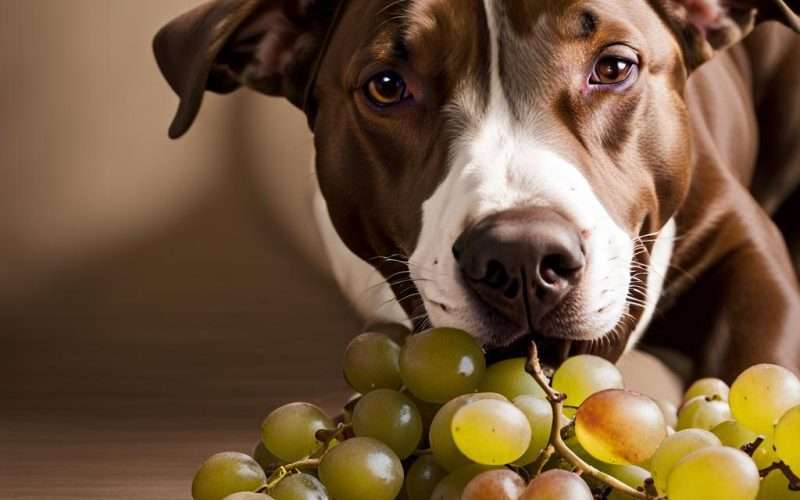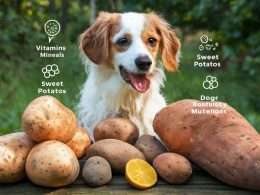Can my puppy eat grapes? The answer is NO. While many fruits and vegetables benefit dogs, grapes are a notable exception. These seemingly harmless fruits are poisonous to dogs and can lead to serious health issues. Dog owners must understand the risks associated with feeding grapes to their pets, as even a tiny amount can be harmful. This section will explore why grapes are dangerous for dogs and what steps to take if a dog eats grapes or raisins.
Are Grapes Bad for Dogs? Understanding the Dangers of Grapes to Dogs
Although various fruits and vegetables can contribute positively to a dog’s diet, grapes are an exception. These tiny fruits are highly toxic to dogs and can cause severe illness. Recognizing the potential dangers that grapes pose to canine health is essential for every pet owner.
Why Are Grapes and Raisins Toxic to Dogs?
Grapes and raisins are toxic to dogs, and the exact reason remains a mystery. Despite this uncertainty, the evidence shows that dogs should never eat these fruits. Whether seedless grapes, dried grapes, or green grapes, all types pose a risk. Dog owners must be vigilant, as even small amounts can lead to severe health issues. The ASPCA Poison Control Center warns against ingesting these fruits due to their toxic substance.
The Mystery Behind Grape Toxicity
The exact cause of grape toxicity in dogs remains unknown, making it challenging for veterinarians and pet owners. What is clear, however, is the danger these fruits pose. If a dog ate a grape or raisins, immediate action is necessary to prevent serious health complications. I also learned that grapes are toxic to dogs and dogs’ health may be in danger.
Identifying Signs and Symptoms of Grape Poisoning in Dogs
Identifying the symptoms of grape poisoning early is crucial for a dog’s well-being. If a dog has eaten grapes or raisins and shows signs of kidney damage, such as pale gums, it’s a serious concern. Owners should avoid giving these fruits to their pets and monitor closely for any signs of grape consumption. Other symptoms induce vomiting, dry nose and mouth, and reduced body weight.
Immediate Actions If Your Dog Eats Grapes
If a dog ingests grapes, immediate actions can differentiate between recovery and severe health issues. Inducing vomiting is one of the first steps if a dog has eaten grapes, especially if signs of distress or trouble breathing are present. Understanding the urgency and knowing what to do if your dog has ingested these fruits is essential for every pet owner.
What To Do If Your Dog ate a Grape
Should a dog consume even a single grape or raisin, the situation demands immediate attention. Due to the unpredictable nature of grape toxicity, contacting an animal poison control center is critical, regardless of the amount ingested. Every case can vary, underscoring the importance of professional advice.
Immediate Steps to Take After Grape Ingestion
If a dog eats a grape or raisin, immediate steps are necessary to mitigate potential risks. Contacting an animal poison control center for advice is essential, as they can guide you through the appropriate actions based on the specific situation and the dog’s health history.
When to Contact Your Vet for Advice After Dog Ate Grapes
If your dog consumes grapes or raisins, contacting your vet for advice should be done immediately. The urgency of the situation cannot be overstated, as grape ingestion can lead to serious health issues, including kidney failure. Your vet can provide crucial guidance and determine if immediate medical intervention is necessary.
Treatment Options for Grape Poisoning
When grapes poison a dog, the treatment options vary based on the severity of the case. Veterinarians will assess the dog’s condition to determine the best action, including inducing vomiting or providing supportive care to manage symptoms and prevent kidney damage.
How Vets Handle Grape and Raisin Toxicity
In cases of grape and raisin toxicity, vets take a comprehensive approach to treatment. Symptoms such as abdominal pain, decreased urine production, increased thirst, and signs of acute kidney failure are closely monitored. Treatment often involves managing the symptoms of grape poisoning and addressing kidney failure in dogs through medical intervention.
The Science Behind Grape Toxicity
The science behind grape toxicity in dogs is complex, involving an emergency veterinarian visit if a dog has consumed grapes. The risk of kidney failure or even death underscores the critical nature of this issue, making immediate veterinary care essential for affected dogs.
The Toxic Components in Grapes and Raisins
While the toxic components in grapes and raisins that affect dogs remain unidentified, theories suggest tartaric acid and potassium bitartrate may play a role. These substances, particularly prevalent in grapes, vary in concentration depending on the fruit’s ripeness, contributing to the inconsistency in toxicity reports. Despite these uncertainties, giving your dog grapes or products containing cream of tartar is strongly discouraged due to the potential risk to their health.
Can a Single Grape Harm My Dog?
Unfortunately, even a single grape can result in kidney failure in dogs, highlighting the significant risk these fruits pose. The potential for acute kidney failure, regardless of the amount ingested, necessitates immediate attention and underscores the importance of keeping grapes and raisins out of reach of dogs.
Myths and Facts About Grape Quantities
Many myths surround the quantity of grapes that can cause harm to dogs, but the reality is that even small amounts can be dangerous. The Animal Poison Control Center advises against underestimating the risk, as individual sensitivity varies greatly among dogs, making any amount potentially toxic.
Preventative Measures to Protect Your Dog
Protecting your dog from harmful foods is a crucial part of pet ownership. Recognizing what foods can risk your dog’s health is the first step in prevention. Besides grapes, several other human foods are toxic to dogs and should be avoided. Creating a safe environment and offering healthy alternatives are essential for safeguarding your pet’s well-being.
Safe Alternatives to Grapes for Dogs
While grapes and raisins are off-limits, many other fruits and vegetables make safe and nutritious dog treats. Apples (without seeds), bananas, blueberries, and carrots can be great alternatives, providing vitamins and fiber. It’s essential, however, to introduce any new food in moderation to prevent digestive upset.
What Fruits Can Dogs Eat Safely?
Certain fruits are not only safe but beneficial for dogs. These include watermelon (without seeds or rind), strawberries, and peaches (pit removed). These fruits offer hydration, antioxidants, and fiber, making them excellent snack choices. Always cut them into manageable pieces to avoid choking hazards and monitor your dog for allergic reactions.
Tips for Keeping Toxic Foods Away from Dogs
Preventing access to toxic foods is critical to your dog’s safety. Always store dangerous foods out of reach and never leave such items unattended where a dog might find them. Educating everyone in the household about which foods are harmful to dogs ensures everyone contributes to a safe environment.
Creating a Dog-Safe Environment at Home
To create a dog-safe environment, secure trash cans and close pantry doors. Consider using child-proof locks on cabinets containing toxic foods. Regularly check the ground during walks for discarded food items that could be harmful. Taking these precautions significantly reduces the risk of accidentally ingesting poisonous foods.
Understanding Dogs and Grapes Through FAQs
Many pet owners have questions about the dangers of grapes and related products for dogs. Addressing these frequently asked questions provides clarity and helps prevent accidental ingestion of harmful foods.
FAQ: My Dog Ate Grape Jelly, Is He OK?
If your dog ate grape jelly, monitoring them closely is essential. While grape jelly might not contain the same level of toxicity as fresh grapes, the exact effects are still not fully understood. Contact your veterinarian for advice, especially if you notice any unusual symptoms. It’s always better to err on the side of caution regarding your pet’s health.
FAQ: Is Raisin Bread Dangerous for Dogs Too?
Yes, raisin bread is dangerous for dogs due to the presence of raisins, which are dried grapes. Even small amounts of raisins can be toxic to dogs, potentially leading to kidney failure. If your dog consumes raisin bread, seek veterinary assistance immediately to assess the situation and determine the best action.
FAQ: Can Dogs Recover from Eating Grapes?
If a dog ate grapes, immediate action could significantly increase their chances of recovery. While some dogs may show no ill effects, others can be susceptible to grape toxicity. A quick veterinary intervention involving induced vomiting or administration of activated charcoal can help prevent the toxins from causing severe damage.
Long-Term Effects of Grape Poisoning on Dogs
Long-term effects of grape poisoning in dogs can include kidney damage or failure, which may not be immediately evident. Monitoring kidney function through blood tests and ensuring proper hydration are critical steps in managing and preventing long-term complications. Early detection and treatment can improve the prognosis for dogs that have consumed grapes.
The Reality of Dogs Ingesting Grapes
The ingestion of grapes by dogs is a serious matter that requires immediate attention. Despite the popularity of grapes as a human snack, their toxic effects on dogs can lead to severe health issues, emphasizing the need for awareness and prevention strategies among pet owners.
Personal Stories of Dogs and Grape Incidents
Personal accounts from dog owners who have experienced grape-related incidents with their pets highlight the dangers and the importance of quick action. These stories serve as cautionary tales, illustrating the potential consequences of grape ingestion and the varied responses of dogs to these toxic fruits.
The Prognosis for Dogs After Eating Grapes
The prognosis for a dog after eating grapes depends on several factors, including the amount consumed and the promptness of treatment. Many dogs can recover with swift veterinary intervention, including fluid therapy and monitoring of grape toxicity symptoms. However, every case is unique, and the severity of the situation can vary.
A Happy Ending for a Lucky Dog
Recovery stories of dogs who have ingested grapes but were quickly treated offer hope and underscore the importance of urine production monitoring and immediate care. These success stories remind pet owners that timely action can lead to a positive outcome when the situation is grave.
Foods to Avoid Giving Your Dog
Apart from grapes, several other foods pose a dog risk and should be avoided. These include chocolate, onions, garlic, xylitol, and macadamia nuts. Each can cause various health issues, from digestive upset to more severe conditions like anemia or kidney failure, emphasizing the need for caution in feeding pets.
Comprehensive List of Toxic Foods for Dogs
Dogs are unique in many ways, including how certain foods affect their health. While humans enjoy a variety of foods, some can be highly dangerous to our canine friends. To protect your dog’s neck and overall well-being, it’s essential to be aware of these toxic foods. Onions, chocolate, garlic, alcohol, cocoa, macadamia nuts, and foods containing xylitol harm dogs. Even small amounts could lead to serious health issues, so we should emphasize caution and vigilance in what we share with our pets.
Why Certain Foods Are Dangerous to Pets
The reason some foods are hazardous to pets, particularly dogs, can be traced back to specific toxic components they contain. For instance, the cream of tartar, a common ingredient in baking, can be lethal for dogs. Similarly, grape and raisin toxicity is a well-documented concern, with these fruits causing kidney failure in some dogs. Understanding the toxic components in these foods is crucial for preventing accidental poisoning and ensuring our pets remain safe and healthy.
Protecting Your Pet’s Health Beyond Grapes
While avoiding grapes and raisins is critical, safeguarding your dog’s health extends to a broader array of precautions. The unpredictable nature of grape toxicity, where some dogs can suffer kidney failure from a minimal amount, underscores the importance of caution with all potentially harmful foods. Consulting with experts such as the ASPCA Animal Poison Control Center or the Pet Poison Helpline is a proactive step in ensuring the safety and well-being of your beloved pet, emphasizing the need for vigilance in all aspects of pet care.
Regular Veterinary Check-Ups and Why They Matter
Regular veterinary check-ups play a pivotal role in maintaining your dog’s health. These visits allow for early detection and prevention of potential health issues, ensuring your pet remains in optimal condition. Comprehensive examinations, including assessing the dog’s neck for any signs of discomfort or abnormality, are crucial for these check-ups. Encouraging regular veterinary visits can significantly contribute to a long, healthy life for your pet.
Lampshade No More: Alternatives to Dog Cones
The traditional dog cone, or “lampshade,” has long been used to prevent pets from licking or biting their wounds. However, advancements in pet care have introduced more comfortable and less intrusive alternatives. These include soft fabric cones, inflatable collars, and even specialized clothing designed to protect affected areas without causing distress or discomfort to the pet. Exploring these alternatives can enhance healing by keeping your pet comfortable and stress-free.
Harnessing Knowledge To Keep Your Puppy Safe
Ensuring the safety and health of your puppy starts with informed decisions, particularly regarding nutrition. Good and sound nutrition habits are foundational to a puppy’s lifelong health and happiness. Pet owners can set their puppies on a healthy, fulfilling life by understanding their specific dietary needs and potential dangers, such as toxic foods. Knowledge and awareness are vital in preventing accidents and ensuring the well-being of our furry companions.
The Importance of Educating Pet Owners on Food Toxicity
Educating pet owners about the dangers of food toxicity is crucial for preventing accidental ingestions that can lead to serious health issues. For example, if a dog eats something toxic like grapes, raisins, or foods containing xylitol, it can experience symptoms such as increased thirst, lethargy, vomiting, and even kidney failure. Awareness and knowledge about these dangers can help pet owners take swift action, preventing possible tragedies and ensuring the safety of their beloved pets.
How Raising Awareness Can Prevent Accidents
Raising awareness about the dangers of certain foods, such as grapes, raisin bread, grape juice, and grape jam, is essential in preventing accidental poisonings among pets. Educating pet owners on these foods’ toxic effects on dogs can significantly reduce the number of emergency visits related to food toxicity. Understanding that seemingly harmless items like grapes or grape products pose a significant risk can empower pet owners to make safer choices, ultimately preventing accidents and safeguarding their health.
Final Thoughts: The Lifesaving Knowledge Every Dog Owner Needs
Empowering dog owners with knowledge about food toxicity, particularly with familiar items like grapes, is a mission every pet guardian should undertake. Understanding the dangers lurking in innocuous foods can save a pet’s life. It’s crucial to recognize signs of toxicity and know when to rush to the veterinary hospital. Beyond emergencies, maintaining a dog’s health includes offering safe dog treats, ensuring regular pet dental care, and staying informed about safe dietary practices. This information isn’t just helpful—it’s potentially lifesaving. As guardians of our furry family members, we must educate ourselves and create a safe environment for them. Let’s harness this knowledge to protect our loyal companions and ensure they lead long, happy lives by our side.








